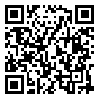BibTeX | RIS | EndNote | Medlars | ProCite | Reference Manager | RefWorks
Send citation to:
URL: http://irj.uswr.ac.ir/article-1-728-fa.html
Objectives: Cognitive flexibility, shame, and emotion regulation difficulties are considered potential mediating factors that may explain the relationship between neuroticism and depression severity. The aim of this study was to examine the mediating role of cognitive flexibility, shame and emotion dysregulation in the relationship between neuroticism and depression among university students.
Methods: A total of 271 students (102 males and 169 females) were selected by cluster random sampling from University of Tehran, Allameh Tabataba’i University, and Iran University of Science & Technology. Cognitive Flexibility Inventory (CFI), Test of Self-Conscious Affect-2 (TOSCA-2), Difficulties in Emotion Regulation Scale (DERS), NEO Five-Factor Inventory, and Beck Depression Inventory-II (BDI-II) were used to collect the data. Pearson correlation, multiple regression, and path analysis were applied for data analysis.
Results: It was found that neuroticism was significantly associated with depression and all three mediators (P<0.0001). Neuroticism by means of emotion dysregulation was the only significant indirect effect on depression (P<0.0001). First total mediation model had a poor fit to the data, CMIN=87, P<0.0001, CMIN/df=21.75, CFI=82, RMSEA=28.
Discussion: These findings suggest that for student depression, emotion dysregulation might be important and future intervention works can examine the effects of targeting emotion dysregulation among university students with high levels of neuroticism and/or depression.
دریافت: 1396/3/26 | پذیرش: 1396/7/29 | انتشار: 1396/12/10





